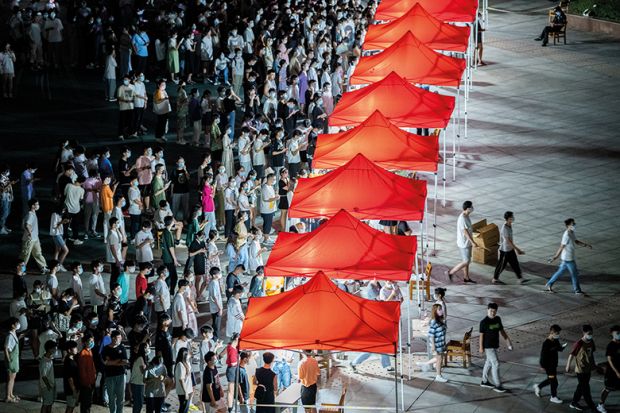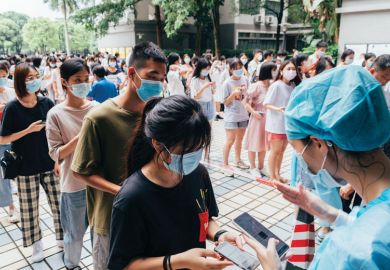China has announced plans to inspect universities over their coronavirus controls, expressing concern that some institutions continue to impose campus lockdowns even when case rates are low.
In a sign of confusion over the continuation of the country’s “zero-Covid” policy, new guidelines from the National Health Commission say state and provincial authorities will form special working groups to inspect institutions “one by one”, particularly targeting those that “casually lock down campuses” and “keep away from offline teaching for a long time”.
Since the virus emerged in 2020, Chinese students have lived under strict infection control policies and have been swiftly confined to their campuses in response to local outbreaks, sometimes for many months at a time. Nearly three years on, students have complained that they have not been allowed to leave even when “no local cases were reported in several months”.
Although details of such arrangements are rarely openly publicised, online complaints indicate that some institutions have been under on-and-off lockdowns for “nearly two years” in Hebei province, where student vlogs recorded lockdown life in May and November this year.
The latest official guidelines also urge universities under lockdown to ensure the supply of daily necessities. Just last week, the alumni association of Zhengzhou University of Aeronautics issued a public letter calling for donations for nearly 30,000 students and staff under quarantine on the campus, because of a “shortage of funding and necessities”.
Kerry Brown, professor of Chinese studies at King’s College London, said the uncertainty over how China’s zero-Covid policy could be sustained was causing “confusion and sheer frustration”.
“China has a quandary: exit lockdown and the peak in rates of Covid goes up, potentially bringing the whole health service to a grinding halt – and bringing with it a whole host of other social unrest issues – or just carry on trying to control things as far as possible. So this policy sits in line with that – taking everything case by case, forever looking for the door out and never actually going through it,” he said.
“I think the signs are that the government knows that zero-Covid is unsustainable. But they still haven’t sorted out what to do about this.”
One officer in charge of academic affairs at a university in Guangdong, who asked not to be named, said some universities “did not take student nurturing into consideration” because they were “worried about undesirable consequences”.
“It seems the new policy signals a looser attitude – but universities are still responsible for preventing outbreaks, so they will remain cautious,” they predicted.
To facilitate inspections, China’s Ministry of Education has also launched a complaints page to encourage students to report non-compliance with Covid-related measures. However, students have expressed concern that the system lacks a privacy policy, and one reported having been asked to “have a chat” after using the contact form.






